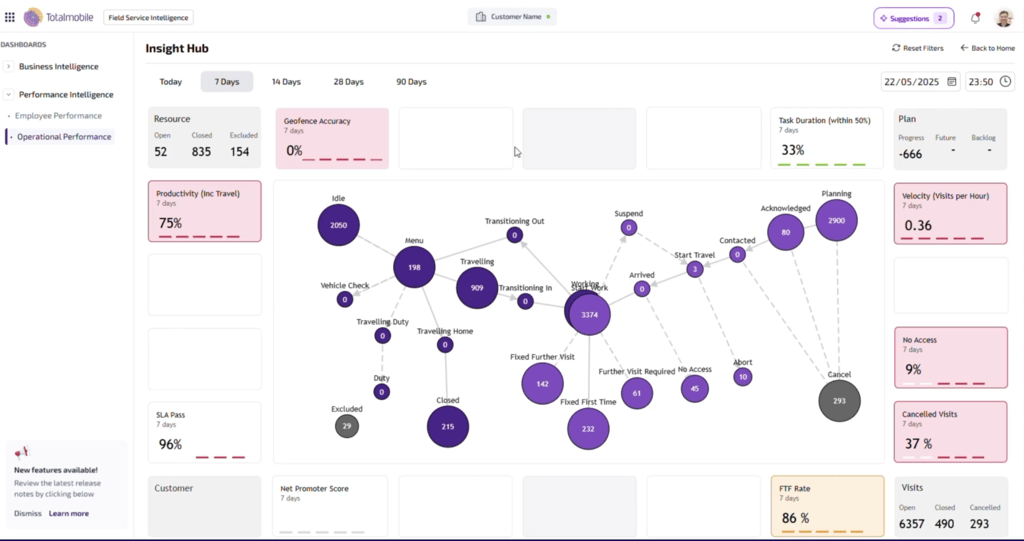
Transforming Field Service Management
WORKFORCE MANAGEMENT
Introduction to Field Service Management
Field Service Management (FSM) refers to the processes used by organisations to manage a workforce that delivers services across many locations. FSM is critical across various industries, including telecommunications, utilities, healthcare, facilities management and construction, where service delivery is paramount to customer satisfaction and operational efficiency. In recent years, FSM has undergone a significant transformation, driven primarily by advancements in technology, which have profoundly altered how businesses manage their field operations.
The evolution of FSM has been marked by a shift from traditional manual processes to more integrated and automated solutions. Historically, scheduling and dispatching were often cumbersome and time-consuming, relying heavily on spreadsheets or paper-based systems. However, modern Field Service Management solutions, such as Totalmobile can harness the power of emerging technologies, artificial intelligence, machine learning and geospatial data. These innovations not only streamline operations but also enable real-time data collection and analysis, leading to more informed decision-making.
Despite advancements in FSM solutions, businesses still face numerous challenges in achieving efficiency and sustainability within their field operations. Common issues include managing employee productivity, minimising downtime, and ensuring compliance with regulatory standards. Additionally, companies often struggle to balance resource allocation against customer demands, which can lead to service delays and customer dissatisfaction. The pressure to maintain operational efficiency while simultaneously improving employee experience and staff retention further complicates these challenges.
As FSM continues to evolve, it is essential for businesses to adopt innovative, technology-driven solutions that address these challenges while fostering efficiency and sustainability in their field operations.




Future Trends in Field Service Management
The field service management (FSM) landscape continues to evolve, driven largely by advancements in technology, particularly in artificial intelligence (AI). As organizations strive for greater efficiency and sustainability, these innovations will play a vital role in reshaping service delivery, optimising resource allocation, and improving customer experiences. The utilisation of AI-driven insights will be crucial in enabling organisations to analyze vast amounts of data quickly and accurately, thereby facilitating informed decision-making.
One prominent trend is the potential for increased automation in FSM processes. Automation can streamline routine tasks, such as scheduling, dispatching, and reporting, allowing technicians to focus on more complex issues that require human intervention. This shift is not just about speed but also about reducing errors and improving service reliability. Furthermore, predictive analytics, powered by AI, will enable organisations to anticipate equipment failures and service needs, thereby enhancing maintenance planning and minimising downtime for customers.
Another key trend is the growing integration with Asset and inventory management, which can provide real-time insights into equipment performance. This consolidation aids in proactive maintenance strategies. As a result, companies can deliver more reliable services to their customers, reducing operational costs and improving overall satisfaction.
Today's consumers demand quicker response times, transparency, and personalized services. Companies within the FSM industry must adapt by leveraging data to meet these rising expectations while developing tailored service solutions. By embracing these future trends, organisations can position themselves advantageously in a competitive market, creating efficiencies and enhancing sustainability through AI-driven insights and a commitment to customer-centric services.
To learn more about how Optko and Totalmobile can support your Field Service workforce, contact us at info@optko.io
Additionally, workforce performance can significantly benefit from AI insights. By monitoring employee productivity and identifying bottlenecks in service processes, organisations can optimize staffing decisions, allocation of resources, and training programs. This ensures that the workforce is empowered with relevant skills and tools to meet operational demands effectively.
Ultimately, leveraging AI-assisted insights in decision-making processes is essential for organisations seeking to elevate their field service management capabilities. By integrating these advanced analytical tools, businesses can foster a culture of continuous improvement, benefiting not only their operations but also their customers.
Example of Totalmobile Analytics and Insights.
Advanced Scheduling Techniques for Optimised Service Delivery
Advanced scheduling techniques play a crucial role in enhancing service delivery. One of the most significant developments in this area is the implementation of dynamic scheduling, powered by artificial intelligence (AI) algorithms. Dynamic scheduling allows organisations to adjust their service schedules in real-time based on various factors such as customer demand, technician availability, and unforeseen events. This flexibility not only ensures that resources are utilised efficiently but also allows for quicker responses to customer requests, thereby improving satisfaction rates
Example of Totalmobile Dynamic Scheduling
Another important technique is route optimisation. AI-driven route optimisation tools analyse multiple variables, including service time at each location, and distance, to determine the most efficient paths for service technicians. By minimising travel time and fuel consumption, organisations can significantly reduce operational costs while maintaining high service standards. This also leads to better time management for technicians, allowing them to complete more service calls within a working day.
The integration of advanced scheduling techniques can transform field service operations. When combined with real-time analytics, organisations can anticipate service demand spikes and reallocate resources accordingly. The adoption of AI-enhanced tools enable companies to better forecast service needs based on historical data, improving overall planning and reducing operational waste.
These technologies do not only serve operational efficiency but also bolster customer satisfaction. Timely service delivery, coupled with effective communication regarding appointment status, cultivates a positive customer experience. As organisations increasingly adopt these AI-driven scheduling techniques, the overall agility and responsiveness of field service operations are transformed, leading to a more streamlined process that benefits both service providers and customers alike.
The Role of Analytics in Field Service Operations
Analytics and deep insights is increasingly becoming an integral component of field service operations, transforming traditional practices into streamlined, efficient processes. Analytics technology encompasses various applications, including predictive analytics, real-time monitoring, and decision support systems, each contributing to enhanced operational efficiency and optimised resource allocation. By leveraging data-driven insights, organisations can make informed decisions that minimise downtime and maximise service quality.
Predictive analytics is one of the most significant applications in field service management. By utilising historical data and advanced algorithms, predictive analytics can forecast potential issues before they arise. For instance, it can analyse equipment performance patterns and predict when maintenance is required, thereby reducing the likelihood of unexpected breakdowns. This proactive approach not only saves costs associated with repairs but also enhances customer satisfaction by ensuring that services are delivered seamlessly without interruptions.
Real-time scheduling is another crucial application for the field service sector. This capability enables efficient tracking of service delivery by optimising routing for field technicians based on urgency and technician workloads so organisations can ensure that resources are effectively utilised, thereby increasing productivity.
Using Advanced analytics and AI-powered decision support systems can provide valuable insights to field service teams, enabling them to make quicker and more informed decisions. These systems analyse vast amounts of data, identifying trends and anomalies that may not be readily apparent to human operators. By enhancing situational awareness, these tools assist in prioritising tasks and allocating resources optimally, which ultimately boosts overall operational effectiveness.
Leveraging AI-Assisted Insights for Better Decision Making
The ability to make informed decisions is crucial for enhancing operational efficiency and ensuring customer satisfaction. Traditional decision-making processes often rely on basic historical data and management intuition, which may not provide a comprehensive view of current operational circumstances. This is where AI-assisted insights emerge as a transformative force, enabling organizations to harness data for deeper understanding and strategic advantage.
AI Assisted Analytics facilitate data-driven decision-making by analysing vast amounts of information collected from various sources such as service calls, customer feedback, and real-time performance metrics. These algorithms can detect patterns and trends that would likely go unnoticed by human analysts, providing field service organisations with timely and relevant insights. For instance, predictive analytics can forecast equipment failures or service demand spikes, allowing teams to proactively address issues before they escalate, thereby improving service quality.
Furthermore, AI-driven insights deliver valuable information regarding customer preferences and needs. By utilising natural language processing and machine learning, businesses can analyse customer interactions and feedback to identify common pain points, leading to tailored service offerings that enhance customer satisfaction. In this way, understanding customer needs not only drives better service delivery but also fosters stronger customer relationships.
